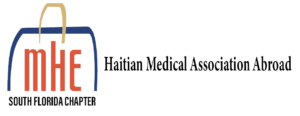After the catastrophic earthquake that hit Haiti on January 12, 2010, where an estimated 300,000 people lost their lives, and more than half a million were injured, members of the Florida Chapter of AMHE sprung into action to provide medical assistance to the earthquake victims.
First Responder
One of our members, Dr Andre Vulcain traveled to Port-au-Prince (PAP), Haiti, on the morning of January 12, on his way to Cap-Haitien, where he heads the only Family Medicine Residency Program in Haiti, with the support of the University of Miami. Dr Vulcain was planning to fly to Cap-Haitien the same day, but because of bad weather conditions in the Northern part of the country, he decided to spend the night in PAP.
He was staying at the Visa Lodge hotel near the airport, when the earthquake hit at 4:53 pm. Fortunately, the hotel sustained only minor damages, and Dr Vulcain was not injured. But all communication lines including telephone, radio, and television were severed. It wasn’t until the next morning that he realized the magnitude of the devastation. He found his way to a hospital in Delmas where he would spend the next four days working sleeplessly, treating patients with crushed injuries, and performing amputations under heroic conditions.
First Flights to Haiti
Forty-eight hours after the disaster, in collaboration with Project Medishare, members of the Florida Chapter, including Dr Marie-Evelyne Moise, Dr Antonia Eysallenne, Dr Rose-Laure Moussignac, traveled to PAP to participate in the medical relief efforts.
On the same day, Dr Alain Innocent, whose wife lost both her parents during the earthquake, also traveled to Haiti with his family, and after making arrangements to bury his in-laws, found his way to the Project Medishare camp near the airport to help treat the injured.
On January 14, Dr Rudolph Moise also traveled to Haiti with a Disaster Rescue Team to search for victims under the rubbles.
Two Critical Care specialists: Dr Reginald Pereira and Dr Arold Augustin traveled to Haiti on January 15 to join the medical relief team at the Medishare camp.
Logistical Challenges
Initially, Project Medishare was using a couple of small aircrafts with limited capacity, to transport medical volunteers and medical supplies to PAP. Priority was given to the trauma surgeons and the employees of the University of Miami and the Jackson Health System. After January 16, our members had very limited access to these flights. We had set up a volunteer list. Hundreds of health care professionals of Haitian descent had signed up to travel to Haiti, but there was no way of getting them there. Commercial airlines were not flying yet to PAP. Therefore, our members had to find other ways to travel to Haiti.
More Help On The Way
An emergency request was sent out to different government agencies, non-profit organizations, and private donors to assist with transportation to Haiti. Just twenty-four hours later on January 17, a philanthropist provided us with his personal aircraft, and the President of the Chapter was able to travel to Haiti to bring a team of medical volunteers and medical supplies to Haiti.
Many other members traveled to the Dominican Republic, and took an eight-hour drive across the border to come to the assistance of the earthquake victims. In the following days, hundreds of medical professionals of Haitian descent would travel to Haiti from New York, New Jersey, Chicago, Boston, Nebraska, Montreal, with the assistance of the US Military, other NGO’s, and through private charter flights.
Out Of The Media Spotlight
There has been very little coverage in the news media about the contribution of Haitian health care professionals from the diaspora to the medical relief efforts after the earthquake. In the aftermath of the disaster, the media spotlight was focused on foreign medical providers treating the injured, completely ignoring the participation of Haitian providers who sometimes were working side-by-side with their foreign counterparts.
Even less attention has been attributed to the contribution of Haitian providers practicing in Haiti. Many of them perished during the earthquake, others lost family members, their offices were destroyed, dozens of them are homeless. Yet, considering the magnitude of the catastrophe, and the more than a half a million injured who received care, the contribution of the foreign providers pales in comparison to the sacrifice of the local Haitian physicians.
Assistance Not Dependence
Now that the emergency phase of treating the crushed injuries is over, and the focus is shifting toward rehabilitation of the amputees, post-traumatic stress disorder treatment, prevention of epidemics, and long term care of chronic illnesses, we should discourage medical tourism in Haiti, and reinforce or create local structures to allow Haitians to help Haitians.
The outpouring of support from the International Community is immensely appreciated, and Haiti will not rise from its ashes without the assisatnce of the global community, but we need to be careful not to perpetuate the dependence of foreign assistance.
There seems to be very little incentive for foreign NGO’s to work themselves out of a job in Haiti. As the reconstruction funds are being disbursed, specific goals should be established, deadlines should be set for NGO’s to accomplish their missions, and provide outcomes and accountability reports.
